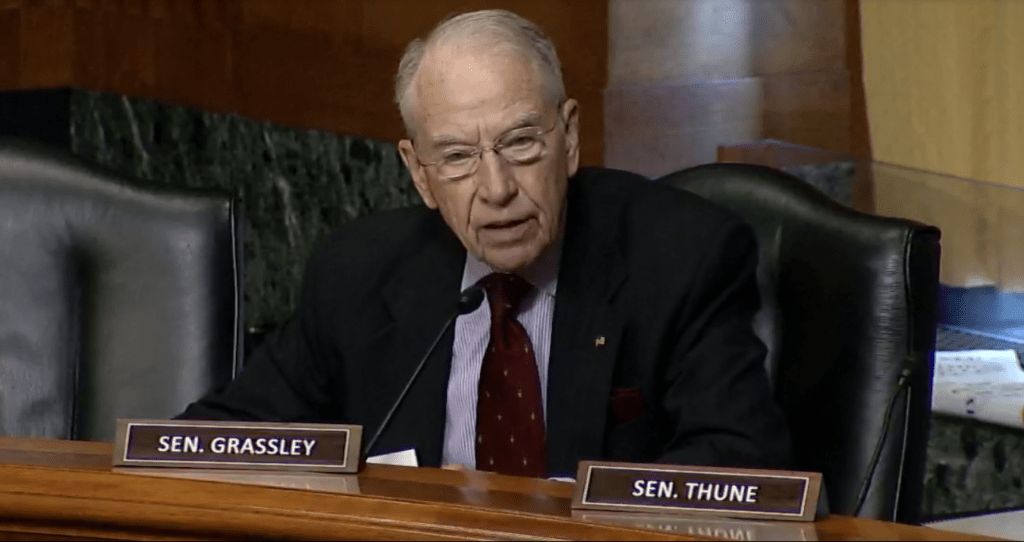Agriculture is the one sector of the U.S. economy that is not in deficit mode. In fact, our trade deficit would be worse without it. But it is the one sector of the economy that is often held hostage during trade disputes, as was most obviously the case during the early years of the Section 301 tariffs imposed on China by the Trump administration.
And so it was no surprise that in a Senate Agriculture Committee hearing on June 9, titled Priorities and Issues Facing America’s Farmers, one of the main issues for American farm groups was market access. A key market for them all was Southeast Asia.
 “We believe that free trade agreements are critical, and we’ve got to get back in the game at establishing those agreements, particularly the two-way trade relationship with Southeast Asia and Japan,” Sheryl Meshke, co-president and CEO of Associated Milk Producers in North Dakota said. She was one of four people providing testimony. “There is a global hunger for dairy production and we can meet that,” she said, adding that non-tariff barriers in Asia, and elsewhere, where often harder to overcome than opening new markets.
“We believe that free trade agreements are critical, and we’ve got to get back in the game at establishing those agreements, particularly the two-way trade relationship with Southeast Asia and Japan,” Sheryl Meshke, co-president and CEO of Associated Milk Producers in North Dakota said. She was one of four people providing testimony. “There is a global hunger for dairy production and we can meet that,” she said, adding that non-tariff barriers in Asia, and elsewhere, where often harder to overcome than opening new markets.
Senator Chuck Grassley (R-IA), a committee member and a long-standing advocate for food commodity exporters, said yet again that he was disappointed that the Indo-Pacific Economic Framework (IPEF) between the U.S., India, and a host of smaller countries in the region, did not include market access talks. Most of this is due to the fact that those countries, large and small, are not interested in opening their agriculture markets to the U.S.
“I keep hearing that IPEF is important for the U.S. to do, but it has no trade provisions along the lines of moving towards free trade,” he said. “IPEF’s not going to serve a useful function.”
Meshke agreed. “Our guiding principle is opening markets,” she said.
Sen. John Thune (R-ND) also brought up market access. North Dakota suffered from trade embargoes on its soybeans in 2019 when China imposed retaliatory tariffs and moved its soy purchases primarily to Brazil.
The entire Committee hearing focused heavily on market access. “Does the U.S. risk losing markets to these countries in Asia if China makes further inroads there?” Thune asked. China is increasing its own soy and wheat production to be less reliant on imports.
Neal Fisher, another North Dakotan, from the North Dakota Wheat Commission, said U.S. agriculture was losing out on markets in Southeast Asia. He then gave a plug to large trade arrangements like the defunct Trans-Pacific Partnership. “I recognize that was not a popular trade deal,” he said. “But I do worry that we are losing out in the Indo-Pacific area, in Southeast Asia, a top 10 market for us, especially if we make it easier for China to move in and pick up that demand.”
Senator Thune wanted more free trade agreements, though these have been on the backburner for years. “The has huge implications for American agriculture exporters,” he said.
“Think of Southeast Asia,” Meshke said. “What a lucrative market that could be for American dairy.”
Other panelists and Senators discussed fruit and vegetable imports coming into the country at the expense of local producers.
“American agriculture needs both predictable and equitable trade policies,” said Gopinath Munisamy, a professor in the Department of Agriculture and Applied Economics at the University of Georgia.
He noted deficits in the things that Americans consume every day – like fruits and vegetables – opposed to the big commodity items like soy, wheat, and corn. The U.S. is also becoming a major beef importer.
On the fruits and vegetable side of the farm economy, the U.S. is expected to export around $14.4 billion and import $42.7 billion this year. Some 44% of it comes from Canada and Mexico.
As far as trade deals for agriculture go, the U.S. has 14 regional trade agreements in place covering 20 countries. From the agricultural and food industry perspective, the major ones include the Uruguay Agreement, USMCA, CAFTA-DR, and KORUS. American consumers and food businesses will import $181 billion worth of commodities and products during fiscal 2022, nearly $18 billion over that of fiscal 2021, according to the U.S. Department of Agriculture.
Senator Ralph Warnock, who chaired the subcommittee hearing on Thursday, said the Biden administration needed to get at least one trade official approved in the USDA. He said that the approval process was taking too long.
“One of the key messages for me in this hearing is that farmers need a seat at the table to talk about trade,” Warnock said. “They need expert help in navigating an increasingly complex market both here and abroad and we have to support them the best way we can so to be sure that their operations are resilient short-term, and long-term.”













